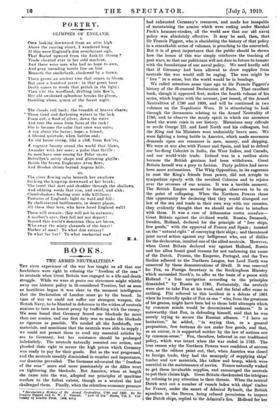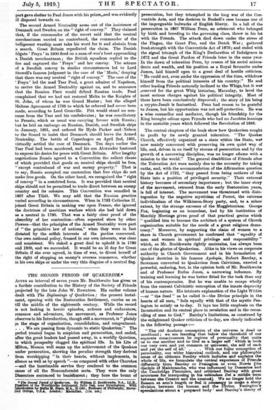BOOKS.
THE ARMED NEUTRALITIES.*
THE stern experience of the war has taught us all that our forefathers were right in refusing the "freedom of the seas" to neutrals when Great Britain was engaged in a life-and-death struggle. While we were at peace our statesmen might whittle away our historic policy in ill-considered Treaties, but as soon as hostilities began it was clear to the meanest intelligence that the Declaration of London must go by the board. In time of war we could not suffer our strongest weapon, the British Navy, to be blunted in deference to the wishes of neutrals anxious to turn an honest penny by trafficking with the enemy. We soon found that Germany feared our blockade far more than our armies, and our first duty was to make the blockade as rigorous as possible. We needed all the foodstuffs, raw materials, and munitions that the neutrals were able to supply ; we could not permit them to send any essential articles by sea to Germany, lest her resistance should be prolonged indefinitely. The neutrals naturally resented our action, and pleaded their right to secure the high prices which Germany was ready to pay for their goods. But as the war progressed, and the neutrals steadily diminished in number and importance, our doctrine prevailed. The Germans advocated the "freedom of the seas" more and more passionately as the Allies went on tightening the blockade. But America, when at length she came into the war, adopted our principles of maritime warfare to the fullest extent, though as a neutral she had challenged them. Finally, when the relentless economic pressure
had exhausted Germany's resources, and made her incapable of maintaining the armies which were reeling under Marshal Foch's hammer-strokes, all the world saw that our old naval policy was absolutely effective. It may be said, then, that Sir Francis Piggott, who is elucidating the history of that policy in a remarkable series of volumes, is preaching to the converted. But it is of great importance that the public should be shown how the lesson of this war simply reinforces the teaching of past wars, so that our politicians will not dare in future to tamper with the foundations of our naval policy. We need hardly add that if Germany had been allowed to draw supplies from neutrals the war would still be raging. The seas might be " free " in a sense; but the world would be in bondage.
We called attention some time ago to Sir Francis Piggott's history of the ill-omened Declaration of Paris. That excellent book, though it appeared first, makes the fourth volume of his series, which begins with the account, just issued, of the Armed Neutralities of 1780 and 1800, and will be continued in two volumes on the Napoleonic Wars. It is stimulating to look through the documents relating to the Armed Neutrality of 1780, and to observe the manly spirit in which our ancestors faced the worst crisis in our history. Historians may ridicule or revile George III. and Lord North and his colleagues, but the King and his Ministers were undeniably brave men. We were fighting a losing battle in America, which made enormous demands upon our resources in men, money, and shipping. We were at war also with France and Spain, and had to defend our far-flung Colonies in India, the West Indies, and Canada, and our world-wide trade. Ireland was in a restless state because the British garrison had been withdrawn. Great Britain herself was a prey to faction. Party politics had never been more acrimonious. The Whig Opposition, in its eagerness to oust the King's friends from power, did not scruple to sympathize openly with the revolted Colonies and to rejoice over the reverses of our armies. It was a terrible moment. The British Empire seemed to foreign observers to be on the point of collapsing. When the Northern Powers chose this opportunity for declaring that they would disregard our law of the sea and trade in their own way with our enemies, they evidently thought that we should not dare to interfere with them. It was a case of Athanasius contra mundumGreat Britain against the civilized world. Russia, Denmark, Sweden, Holland, declared for the principle of "free ships, free goods," with the approval of France and Spain ; insisted on the" natural right" of convoying their ships ; and threatened joint naval action against any belligerent who, out of dislike for the declaration, insulted one of the allied neutrals. However, when Great Britain declared war against Holland, Russia and her allies found good reasons for not embracing the cause of the Dutch. Prussia, the Emperor, Portugal, and the Two Sicilies adhered to the Northern League, but Lord North was unmoved by these demonstrations of illwill. It was reserved for Fox, as Foreign Secretary in the Rockingham Ministry which succeeded North's, to offer as the basis of a peace with Holland "a free navigation according to the principles demanded" by Russia in 1780. Fortunately, the neutrals were slow to take Fox at his word, and the fatal offer came to nothing. Pitt referred to this incident in a debate of 1801 when he ironically spoke of Fox as one" who, from the greatness of his genius, might have been led to those bold attempts which by common minds would be denominated rashness." It is noteworthy that Fox, in defending himself, said that he was merely trying to secure the Russian alliance. "I have no hesitation," he added, "in saying that, as a general proposition, free bottoms do not make free goods, and that, as an axiom, it is supported neither by the law of nations nor by common-sense." Fox, therefore, believed in our traditional policy, which was intact when the war ended in 1783. The true reason why the Northern Powers were confident of success was, as the editors point out, that, when America was closed to foreign trade, they had the monopoly of supplying ships' timber and raw materials, like tallow and hemp, which were essential to the maintenance of navies. France naturally wished to get these invaluable supplies, and encouraged the neutrals to put their claims high. Great Britain checkmated the intrigues by refusing to pay attention to their threats. When the neutral Dutch sent out a number of vessels laden with ships' timber for France, under the escort of Admiral Bylandt, the British squadron in the Downs, being refused permission to inspect the Dutch ships, replied to the Admiral's fire. Holland for her
part gave shelter to Paul Jones with his prizes,,and was evidently ill disposed towards us.
The second Armed Neutrality arose out of the insistence of Denmark and Sweden on the "right of convoy." They claimed that, if the commander of the escort said that the neutral merchantmen carried no contraband, the commander of the belligerent warship must take his word for it and abstain from a search. Great Britain repudiated the claim. The Danish frigate Freya' in 1800 fired on a man-of-war's boat approaching a Danish merchantman; the British squadron replied to the fire and captured the ' Freya ' and her convoy. The seizure of a Swedish convoy in similar circumstances led to Lord Stowell's famous judgment in the case of the 'Maria,' denying that there was any neutral "right of convoy." The case of the ' Freya ' led the mad Tsar Paul, a great admirer of Napoleon, to revive the Armed Neutrality against us, and to announce that the Russian Fleet would defend Russian trade. Paul complained that we had not restored Malta to the Knights of St. John, of whom he was Grand Master ; but the alleged Maltese Agreement of 1798 to which he referred had never been made, according to Lord Grenville. Pitt would stand no nonsense from the Tsar and his confederates ; he was conciliatory to Prussia, which as usual was currying favour with Russia; but he laid an embargo on Russian, Danish, and Swedish ships in January, 1801, and ordered Sir Hyde Parker and -Nelson to the Sound to insist that Denmark should leave the Armed Neutrality. The battle of Copenhagen on April 2nd, 1801, virtually settled the case of Denmark. Ten days earlier the Tsar Paul had been murdered, and his son Alexander hastened to express his desire for peace with Great Britain. After lengthy negotiations Russia agreed to a Convention the salient clause of which provided that goods on neutral ships should be free, "except contraband of war and enemy property." That is to say, Russia accepted our contention that free ships do not make free goods. On the other hand, we recognized the "right of convoy" in a restricted form. It was provided that neutral ships should not be permitted to trade direct between an enemy country and Its colonies. This Convention was annulled in 1807 after Tilsit. We may add that the Russian practice varied according to circumstances. When in 1793 Catherine II. joined Great Britain in making war upon France, she ignored the doctrines of maritime warfare which she had laid down as a neutral in 1780. That was a fairly clear proof of the absurdity of her contention—often repeated since by other Powers—that the principles of the Armed Neutrality were part of "the primitive law of nations," when they were in fact dictated by the selfish interests of the parties concerned. Our own national policy, framed in our own interests, was clear and consistent. We risked a great deal to uphold it in 1780 and 1800, and we succeeded. It would be an ill day for Great Britain if she ever agreed, in time of war, to divest herself of the right of stopping an enemy's oversee commerce, whether in his own ships or under the very thin disguise of a neutral flag.















































 Previous page
Previous page